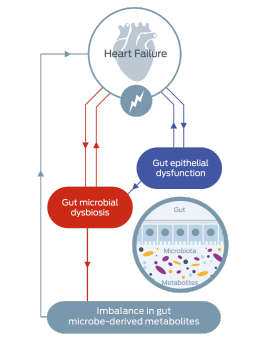
DNA

Adapted from Kamo et al., 2017
Heart-Gut Axis
Research continually reveals the central role that intestinal microbiota play in maintaining health and the development of disease. One new area of research is the heart-gut axis.
The intestinal microflora metabolize dietary nutrients into metabolites. Some metabolites are beneficial, such as short chain fatty acids which have key roles in energy use, modulating inflammation and the immune response. Gut bacteria can also produce trimethylamine N-oxide (TMAO), a compound associated with accelerated heart disease.
In heart failure, decreased cardiac output leads to reduced intestinal blood flow and edema. Under these conditions, bacterial composition of the gut and intestinal function change in ways that can accelerate inflammation and the progression of heart disease.1–5 Additionally, the decreased blood flow and intestinal function can lead to poor nutrient absorption and contribute to cachexia.
Numerous studies in people have linked heart failure with changes in the gut microbiome. Heart failure patients, for example, typically have reduced diversity and depletion of core intestinal microbiota.6
In a controlled dietary intervention study, Purina Scientists showed that the gut microbiome of dogs is more similar to that of people than the microbiomes of other species.7
This finding suggests that studies of the human heart-gut axis may contribute insights that improve cardiac health in dogs, too.
Key things to remember
- Studies show there is a heart-gut axis: intestinal microbiota can affect cardiovascular health and vice versa.
- Purina research showed the canine microbiome has structural and functional similarities to the human microbiome.
- Human microbiome studies may offer innovative approaches to canine cardiovascular disease.
Explore areas of transforming heart health:
Find out more
- Jin, M., Qian, Z., Yin, J., Xu, W., & Zhou, X. (2019). The role of intestinal microbiota in cardiovascular disease. Journal of Cellular and Molecular Medicine, 23(4), 2343–2350.
- Kamo, T., Akazawa, H., Suzuki, J. I., & Komuro, I. (2017). Novel Concept of a Heart-Gut Axis in the Pathophysiology of Heart Failure. Korean Circulation Journal, 47(5), 663–669.
- Tang, W., Li, D. Y., & Hazen, S. L. (2019). Dietary metabolism, the gut microbiome, and heart failure. Nature reviews. Cardiology, 16(3), 137–154.
- Wang, Z., Liu, Y., Liu, G., Lu, H., Mao, C. (2018). L-Carnitine and heart disease. Life Sciences, 184, 88–97.
- Zhao, Y., & Wang, Z. (2020). Gut microbiome and cardiovascular disease. Current Opinion in Cardiology, 35(3), 207–218.
- Luedde, M., Winkler, T., Heinsen, F. A., Rühlemann, M. C., Spehlmann, M. E., Bajrovic, A., Lieb, W., Franke, A., Ott, S. J., & Frey, N. (2017). Heart failure is associated with depletion of core intestinal microbiota. ESC heart failure, 4(3), 282–290.
- Coelho, L. P., Kultima, J. R., Costea, P. I., Fournier, C., Pan, Y., Czarnecki-Maulden, G., Hayward, M. R., Forslund, S. K., Schmidt, T., Descombes, P., Jackson, J. R., Li, Q., & Bork, P. (2018). Similarity of the dog and human gut microbiomes in gene content and response to diet. Microbiome, 6(1), 72.


